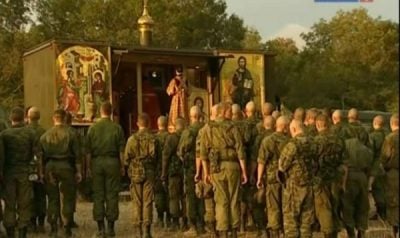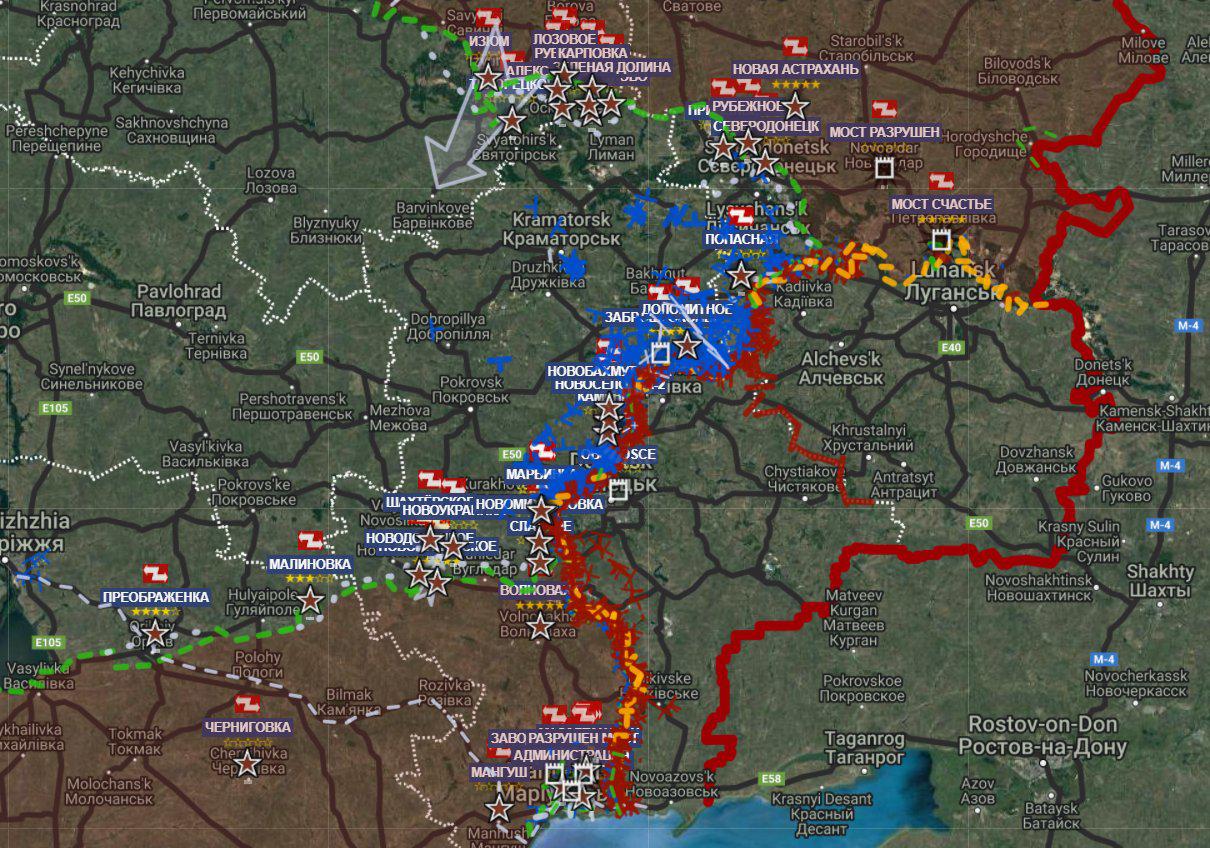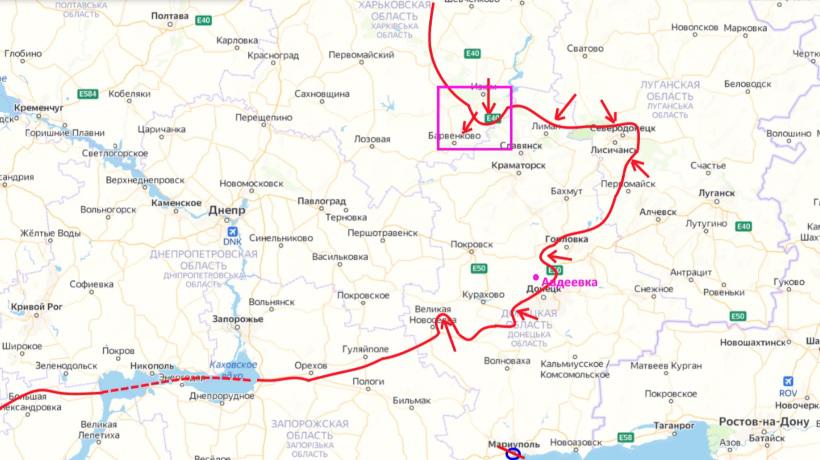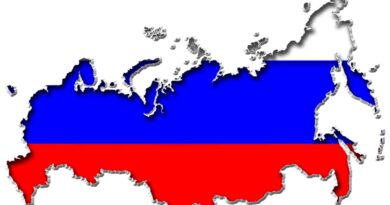“Ukraine’s Fate Is Now in Russia’s Hands”: Mike Whitney Interviews Marko Marjanovic

Mike Whitney: The war in Ukraine appears to be shifting eastward to an area in the Donbass around the city of Krematorsk. This is where upwards of 60,000 Ukrainian combat troops are “dug-in” and prepared to take on the advancing Russian army. In one of your posts, you suggested that the “real war” is about to begin. Most of the military analysts I have read, seem to agree with you on that point. Some analysts, however, think that it could take up to three weeks for Russia to assemble the troops and material needed to launch a full-blown offensive. Others say the artillery phase of the battle has begun already. In your opinion, will the upcoming battle determine the outcome of the war? Also, what will it take for Russia to prevail in this extremely challenging fight against an entrenched and capable army?
Marko Marjanovic: I have no idea how long it takes to get the forces that were in the Kiev operation ready for a coherent, ambitious and well-supported effort in the southeast. We would need a staff officer to tell us that. Somebody who knows trains.
Generally speaking, better-prepared offensives work better. The element of surprise now being out the window, you want to err on the side of too late rather than too soon. Taking a few extra days for buildup that you didn’t really need, is far better than starting a few days too soon.
Throwing forces into attack before you are able to properly back them — with opposite arm forces for support, supplies to sustain their success, and follow-on forces to exploit it — is the surest way to have wasted effort, and casualties with little to show for them.

The battle of Donbass started a couple of days after the start of the war itself.
If you look at the map you will see that Ukrainians have already been dislodged from two-thirds of the old contact line. Only one-third of the contact line remains.
In the south the Russians took Volnovakha which opened a direct rail link to their forces in the south (making Ukrainian control of Mariupol a moot point), and in the north the Russians continue to make slow but steady progress past Izyum carving out a salient that threatens to envelop the Ukrainians to the east of it.

This is a battle that is already 6-weeks old, it is just that until now the Russians didn’t have forces in the theater sufficient for truly spectacular success — because they were not focusing on this theater. Now they are getting massive reinforcements and if they stay true to the best Russian military traditions they will use them all at once and in a way that aims for something big, rather than squander them piecemeal.
How the battle is resolved won’t determine the outcome of the war, but it will determine whether there is a future for the Ukrainian military on the left bank outside cities.
If the Ukrainian army in the Donbass is encircled and marched into captivity then it would demonstrate the folly of trying to hold solid lines against the Russians out in the open.
You will note that in the north the Ukrainians did not even attempt to create and hold a solid line against the Russians but were quick to pull back into cities like Chernigov, Kiev and Sumy.
This is somewhat understandable because of the Russian strength in numbers in the north and the fact they had achieved a measure of operational surprise (Zelensky didn’t order reserves to start standing up until Feb 23).
If offering battle out in the open ends in disaster even for the strong and entrenched Ukrainian Donbass army it will show the unworkability of such an approach.
The Ukrainians might still form some sort of a frontline against the Russians but these wouldn’t be more than skirmishing lines to harass the enemy when standing still and offer token resistance to slightly delay and disorganize it when it advances.
This would still leave open the problem of the right bank and the problem of sieging left-bank cities, but in a certain sense it would leave the Russians the masters of the left-bank and Ukraine a rump state.
Russia can not “not prevail” in Donbass. The fighting so far proves this. Russia has already dislodged Ukraine from two-thirds of the old contact line. If it is contended to slowly push back Ukraine from the rest it can do so. The question is can it do something more? Something with a big big-picture payoff?
For example — surrounding numerous Ukrainian troops and forcing them to lay down their arms because they ran out of ammunition, rather than having to continuously push back the same units bit by bit, over and over again in a protracted grind?
Even wrestling control of Donbass quickly only to encounter the expelled JFO army again in the built-up environments of Dnipro, Zaporozhye, Poltava and Kharkov isn’t ideal.
Arguably a spectacular, decisive victory wouldn’t take more than what Russia has already demonstrated. The way in which the Russian drive on Kiev was conducted especially early on was very perplexing. Also, the drive stalled outbefore it could encircle the Ukrainian capital from either the east or the west. However, that does not mean that on a certain level it wasn’t very, very impressive.
In not much more than 10 days, the Central Military District covered more than 200 miles past Sumy to the outskirts of Kiev. The push may have finally run out of steam just before the strategic payoff, but that kind of advance is nonetheless hugely impressive in any book. Arguably had the Central Military District and the 1st Guards Tank Army from the Western one been set to advance 200 miles past Kharkov to Pavlograd and Dnieper instead, the Russians could have had their Donbass cauldron formed a month ago.
MW: As you know, your views on the war are quite a bit different than other analysts like Scott Ritter, Larry Johnson, the Saker and Colonel Doug MacGregor. All three of these men have considerable experience and all three seem to think the Russians are achieving their strategic objectives. Your analysis seems much tentative and, perhaps, even pessimistic which indicates that the eventual outcome is far from certain. Can you imagine a scenario in which the Russian army wins its battle in the Donbass but at a cost that undermines its overall goals?
MM: It isn’t the case that the Russian military can win in Donbass in a way that is actually a defeat for it. It’s just a matter of a possible missed opportunity.
At the moment when the war kicked off one-third of the Ukrainian standing army was in the extreme east of the country, its escape routes limited by a giant river and pressed against Russian-controlled territory from two sides (now from three sides). Arguably the Russians should have kicked off a focused operation to cut off its retreat and disarm it right there and then.
The reason they didn’t is because they went for something even more ambitious — a knockout blow against the enemy capital. Something that offered the prospect (no matter how distant) of decapitating not just the Ukrainian standing army but the entire state.
When that failed they again reacted in a very aggressive manner — by suddenly and rapidly abandoning their entire Kiev operation wholesale. In a generally well-planned withdrawal they evacuated 50 percent of their forces in Ukraine in a matter of days.
In the meantime they compressed the Ukrainian “Joint Forces Operation” army into a third of its former frontage, bombed the railway junctions to its back, and taken places like Izyum and Huliaipole from which they threaten its rear.
The Ukrainian JFO army seems as ripe for an encirclement as it will ever be. If the Russians don’t go for it then I don’t know how to interpret that. It would mean that they went from extreme ambition (one could say overambition) to extreme conservatism. I don’t expect that.
If that happens then the only possible explanation that comes to mind would be that their maneuver elements haven’t suffered the 8-10% losses (mainly wounded) that you can extrapolate from official figures (5000 casualties 18 days ago sustained overwhelmingly by the 80K men in BTGs), but more like the 20-40% losses put forward by some Western commentators. In short, the only explanation would be that the army withdrawn from Kiev is a spent force, which I don’t buy.
Pessimism is relative. Vladimir Putin has explained that Ukrainians and Russians are one people. Ukrainians are the historic Malorusi or Little Russians. So what would it say of the Russians’ little brothers if they were defeated by a three-day simulation of a war as were the wildest hopes initially?
Putin has signaled that the war is being fought to in some way (re-)assimilate the Ukrainians to a joint all-Russian (Rus’) destiny and identity. Russian troubles in conquering Ukrainians show that they are indeed worth assimilating.
And if 145-million Russia ultimately fails to subdue 40-million Ukraine, well then, maybe it is better that these Little Russians remain as Ukrainians?
It is good to remain tentative. The less attached one is to expectations the more likely one is to be seeing rather than projecting. Feeding the brain from eyes and not eyes from the brain.
The men who in June 1941 insisted the war against Russia would be over in 11 weeks were very experienced. They filled Hitler’s high command and had just conquered 9 nations.
Experience is nice but reading a map is a rudimentary skill. Broad-stroke strategy is far more straightforward and common sense than even just high-school math. Acquiring the basics of it is far less of a challenge than resisting biases even just a tiny bit.
MW: How does this end? Even if Russia wins every battle from this point on without losing another Russian serviceman, NATO and the US will continue to pump more lethal weapons into western Ukraine fueling an insurgency that could last for decades. In your opinion, is there any way out of this vicious circle of relentless violence and death?
MM: I don’t know what the end point of this is. It is fundamentally unknowable plus there is the big unknown of how determined Putin is to see this through to a favorable outcome.
On the one hand he has so far always escalated to the next order of business. On the other hand official signaling remains mixed, and Putin is keeping his cards so close to the chest that it’s actually undermining the effort to an extent.For example pro-Russian Ukrainians don’t know if it’s safe to work with Moscow, and Russian soldiers don’t know if they aren’t fighting for cities Russia won’t later give back.
Logically if the Russians don’t occupy every last bit of Ukraine then it ends in a frozen conflict. I think Russia could have a frozen conflict even now, but a frozen conflict with a 35-million state that will henceforth be as militarized as Israel is a terrible security situation to be in. Now, if that power can be cut down to say 20-million that becomes a lot more tolerable. Then again, by that point the hardest part of the job is already done so might as well go for the whole thing…
I am not so sure there is an armed insurgency in the cards in Russian-controlled Ukraine. I am not sure it is necessary, or the most effective way for Ukrainians to resist.
A double-track strategy of high-profile terrorism inside Russia (to keep foreign attention) and unarmed civil disobedience inside Russian Ukraine might be more effective and less bloody for Ukrainians.
I would also caution against the very modern notion that insurgencies always win. Historically insurgencies almost always lose. It is not at all similar to be occupying a piece of land because you want to bring it representative democracy and female education, or occupying it because you want to attach it to your homeland and keep it forever.
The fate of Ukraine is out of the hands of Ukrainians. It is now exclusively in the hands of Russia. The only thing up to Ukraine (and the US) is to determine how high a price Russia would have to pay to get Ukraine in whole or in part. Then it is up to Putin and the Russians to determine whether they want to pay that price or not. (And if they don’t then there will be a different price to be paid.)
Is Moscow willing to see its enterprise through to its logical conclusions and not “cut and run”? I don’t know. I have no idea if Moscow is ready for the decades-long re-assimilation project because I don’t even know if it is willing to do what might be required to win the conventional war.
There are a number of signs that the Russian war effort is crying out for manpower. Firstly we see that Chechen and non-Chechen Rosgvardia are being used as urban shock infantry which is definitely not in the job description of paramilitary police. Secondly, we see that the military superpower of Southern Ossetia with its total population of 50,000 has been invited to join the war. Thirdly and most importantly we see deep and wide conscription in Donetsk and Lugansk including through roundups in the streets.
This is something that the hugely popular (30 million monthly views) and hugely patriotic Russian military-oriented site Voennoe Obozrenie (Military Review) has written about. They wrote about it, were told to dial down their criticism because it would be addressed shortly. They did, but it wasn’t. So they’re at it again:
…in the LPR they are massively conscripting and sending to the front line school teachers and university professors. And there they are captured, causing outright laughter from Ukrainian soldiers.
We were told: “There is no need to publish this, we will figure it out.” A month has passed, everything has remained as before. Teachers on the front line, killed, injured, captured. Because from a teacher to a good soldier is only in the movies.
But in the LPR, this suits everyone. For some reason, in Russia too.
At the same time as untrained Donbass civilians are sent to active duty with little to no training, Russia is releasing fully-trained soldiers — conscripts whose 12 months are up.
Starting with April 1st the batch from last spring is being released on schedule. Up to 135 thousand trained soldiers. (More qualified to fight in a war than either Russian police or Lugansk teachers.)
It’s quite bizarre. Friend has deemed it “Operation ABC” or “Anyone But Conscripts”. On the one hand the frenzied and desperate effort to secure non-conscript manpower from every possible corner. On the other, the stubborn refusal to do the one thing that has the power to decisively address the problem and mobilize at home.
The Russians were never asked if they wanted this war, but understanding intuitively that Rubicon has been crossed they support the war effort. Russia’s bridges have been burned and their fate for decades to come has been decided. They will live the rest of their lives under a Western economic siege. The only thing that is up to them is whether Malorussia will be on the side of the besiegers or besieged together with them. They would much prefer the latter and very much want to win this war.
Does Putin? Moscow has billed this a war to make the world safe for Donbass. To save Donbass from nothing less than genocide. You would think a lofty goal like that might justify using a Russian conscript or two?
Not only has Putin declined to extend conscripts, but he has categorically stated on multiple occasions that conscripts are not, and will not be sent to Ukraine.
This is worse than it sounds. Conscripts aren’t evenly distributed among roles so that a unit void of conscripts would be just a downscaled version of itself. They overwhelmingly fill support roles so that a unit without its conscripts might still have 90% of its combat soldiers and the same ammunition needs, but is maybe missing 80% of its truck drivers supposed to be ferrying the ammo. (The only reason this doesn’t kneecap the army outright is that each brigade only sends out 1 or 2 reinforced battalions as BTGs so support personnel from the entire brigade can be consolidated into just these 1 or 2 battalions. But it does prevent using the whole 3-battalion brigade.)
I wouldn’t over-romanticize Putin’s non-use of conscripts as humanism or mercy. It’s a good deal for the conscripts and their mothers, not so great a deal for the contract soldiers, Rosgvards, and Lugansk bakers supposed to fight an ever-mobilizing Ukraine on their own.
There is an element to it where Putin has burned the bridges for Russia but hasn’t yet clearly articulated that his own bridges were burned with Russia’s. If he thinks that because he isn’t calling it a war and isn’t using conscripts that he can deliver something short of a clear and major victory and survive as a leader in good standing and a positive legacy he is probably miscalculating.
To be fair, the Russian pattern so far has been to move up the escalation ladder only once the lesser option has been driven to utter exhaustion and proved unworkable beyond all possible doubt.
They started with only scarce and indirect support for Donbass while championing special status for it that would effectively serve to give Ukraine’s pro-Russians some say in Kiev on Ukraine’s foreign orientation. Then moved on to greater and more direct support in August 2014 that got them Minsk I that would accomplish some of the same. Doubled down at Debaltsevo in 2015 that got them a much clearer Minsk II. Waited out Poroshenko and gave the successor a year to do Minsk II or anything at all to represent also the pro-Russian tendencies in Ukraine.
Only when all that failed did they launch the February 24-27 psychological phony-war operation to try to bluff Ukraine into unraveling. After the 27th they were already ramping up how the regime-change was prosecuted into full warfare, but for the moment doubled down on the Kiev goal with the reinforcement wave of the second week that got them to the Kiev-Zhitomir highway in the west and to eastern Kiev outskirts in Bogdanovka and Brovary (they had already been in western outskirts since day 1). But when that effort conclusively stalled out and it was painfully clear that the Ukrainian state had survived and would continue to fight even if Kiev was cut off or even taken, they packed up and moved on to the next order of business — textbook war that we’re now going to see in Donbass and then beyond.
This is what I keep talking about. A Kiev withdrawal only seems like Russia downgrading its ambitions. But what it actually means is Russia moving up the escalatory ladder because the previous, cheaper and lesser-force approach had conclusively exhausted itself.
So perhaps when war-without-conscripts hits a wall Moscow will again escalate to war-with-conscripts. So far it always has.
Probably the Russian military can wrap up the Donbass battle as it is now. But especially if they win big Russian manpower needs will likely only grow. Owing to their greater firepower the Russians are actually able to keep Ukrainian formations bottled up inside cities even when the latter enjoy numerical superiority. However there sure are a lot of cities to cordon off…
And taking the cities, well that will be an extra special headache. In the best case scenario all the Syria experience will come in handy, from “humanitarian corridors” to “green buses” to “reconciliation”…
And in the worst-case scenario for Moscow…well, history abounds with greater powers who tired of sieging lesser powers because it was costing too much treasure. It’s just that this time the Empire’s counter-war has cut Moscow’s avenues of retreat. There is no putting the genie back in the bottle.
*
Note to readers: Please click the share buttons above or below. Follow us on Instagram, Twitter and Facebook. Feel free to repost and share widely Global Research articles.
This article was originally published on The Unz Review.
Marko Marjanović is the editor of Anti-Empire.com.
Mike Whitney, renowned geopolitical and social analyst based in Washington State. He initiated his career as an independent citizen-journalist in 2002 with a commitment to honest journalism, social justice and World peace. He is Research Associate of the Centre for Research on Globalization (CRG).
Featured image is from TUR


